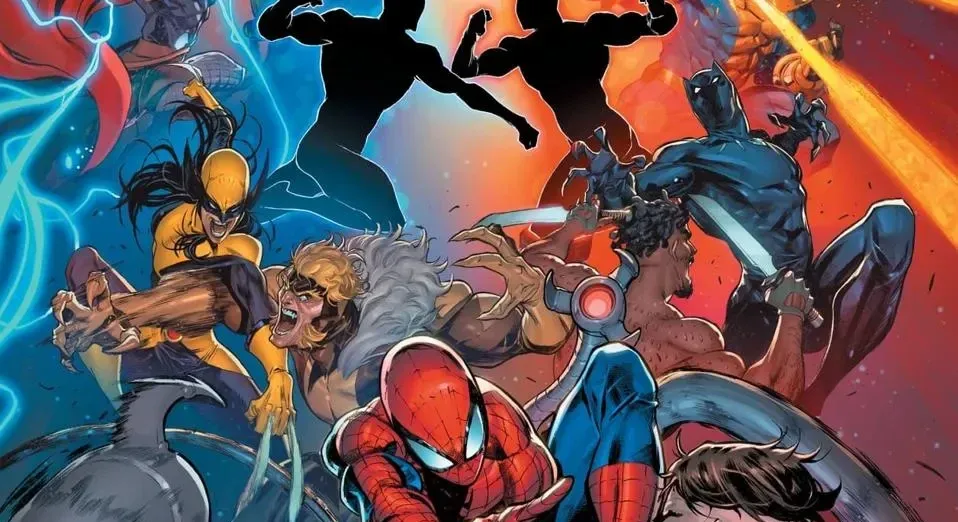
The Marvel Multiverse Roleplaying Game enters the market at a complicated time. The public’s enthusiasm for the Marvel brand is waning, and the field of superhero RPGs has been crowded for some time. Even niche of officially licensed Marvel roleplaying games has a pedigree of success. Lead writer and designer Matt Forbeck has more than proven himself in the world of fiction and RPG design, with contributions to Mutant Chronicles, Deadlands, and Tales From the Loop. Each work displayed strength of aesthetic and mechanical design. Multiverse has some of that same shine, but muddled through the lens of the Marvel license. This is by no means a bad game, but whether its successes will be enough to entice you is a more complicated question.
Access to the Marvel license brought with it a lot of qualities. The 318 page core book ranges wide over Marvel’s characters, even if it spends less focus on their setting. Sometimes pulling art directly from the comics, you’ll see uncountable action shots of heroes and villains, punctuating pages with clean layout and organization. Each chapter has a different color on the edge of its pages, a nice touch that eases navigation. It helps compensate for the three pages of index. The book takes time to reference the concept of safety tools and sessions zero. Unfortunately it also spends little time reviewing those tools, instead referring you to other resources, offloading the work to you and other writers if you want to know more.
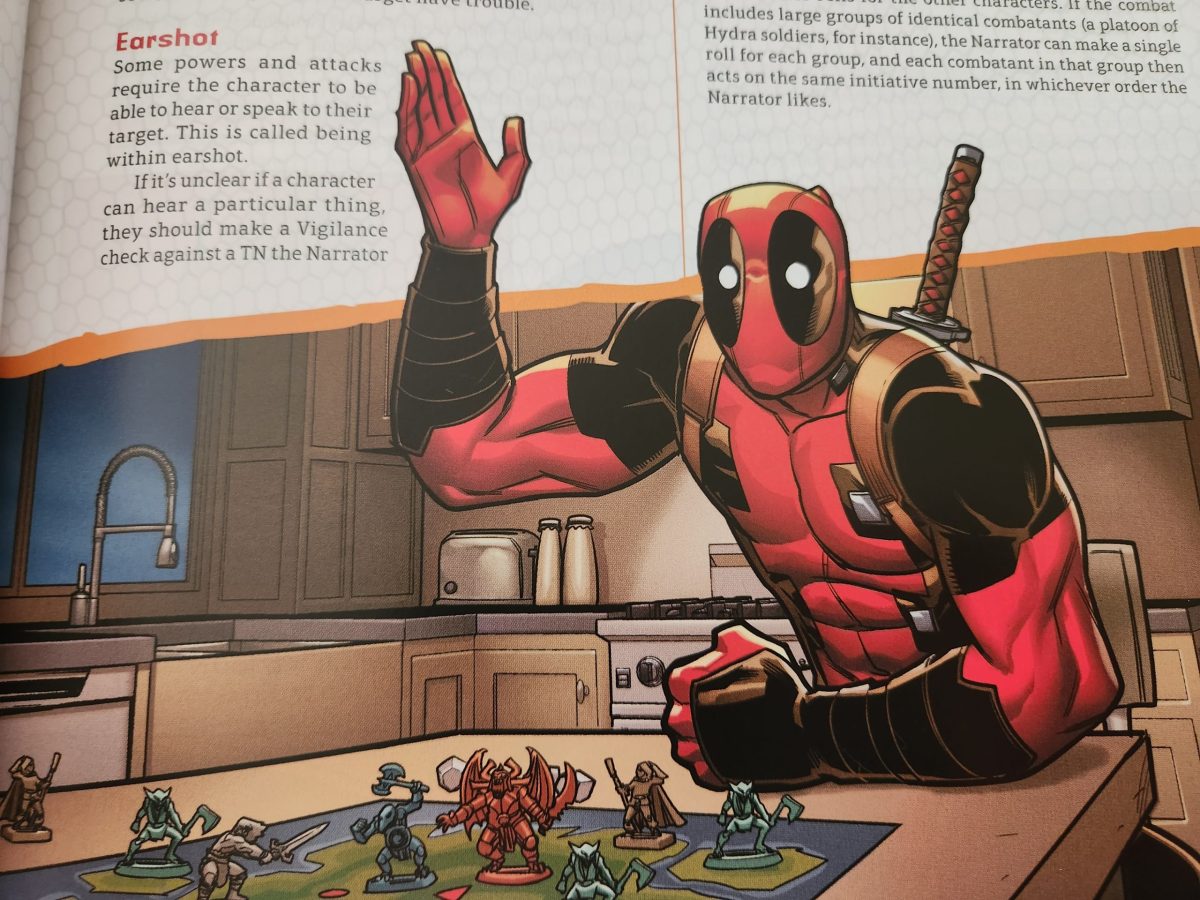
For basic task resolution, you will roll 3d6, add a relevant attribute bonus, and compare to the task’s target number. Oh I’m sorry, you will roll d616, as the book refers to it to tie the dice roll to Marvel. One of these dice (always the central one, to play into the theme) is a Marvel die, which replaces the 1 with an M. Rolling the M will grant you a Fantastic success or failure, adding an extra bonus onto whatever you are attempting to do. Conditions can grant you Trouble, forcing you to reroll your best die and take the worse result, or Edge, letting you reroll and choose the better result.
It’s worth noting that a full 128 pages, or 39% of this book is made up of the Characters chapter. This chapter covers the basic histories, personalities, and character sheets for a sizeable chunk of the Marvel universe. In other circumstances I might call this padding, but this game’s context as an officially licensed product speaks against that interpretation. In this case, the brand is what attracts the customer, and the book uses that brand to its strength. At the same time a collection of premade characters and NPCs, this can save a lot of time for the GM or players, who may not want to bother making their own characters if they can choose from their pick of the setting’s heroes. That isn’t to say that using these premade characters isn’t a lot of work – it still requires a marathon of page flipping – but to understand that you’ll need to know what a character consists of. Page-flipping is complicated further by the fact that the only digital versions of this book come from virtual tabletops or a Kindle release. In what I can only assume is a measure to cut down on piracy, they have also made it extremely inconvenient for paying customers to access this game.
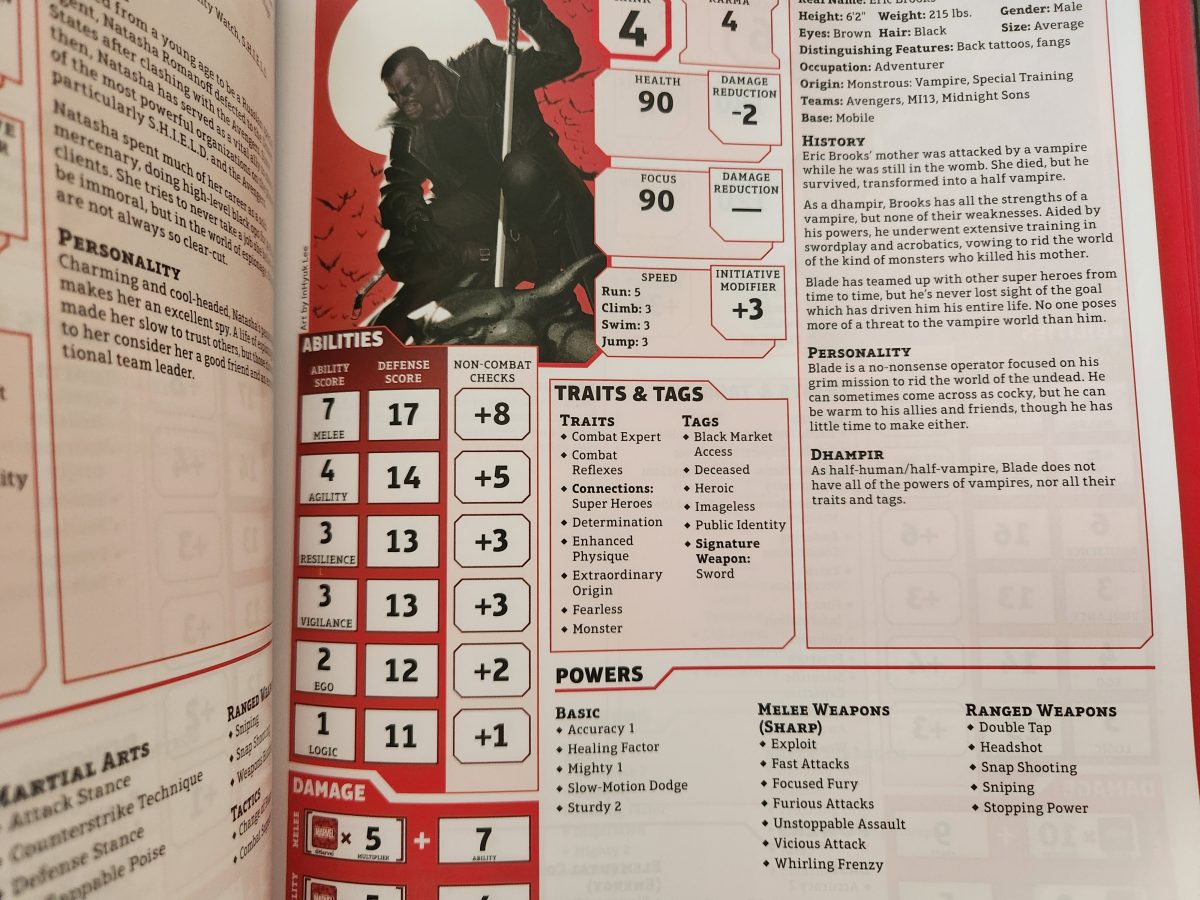
Blade (who doesn’t have a movie coming out, apparently) is a Rank 4 character who requires you to look up 17 powers, not to mention the traits, tags, and signature weapon
Characters have six attributes that model well to those of D&D, but renamed to spell out MARVEL down the page. Each attribute has its own defensive stat and bonus for non-combat checks. Beyond that, you will have some derived movement stats, an initiative score, and four types of damage, which stem from different sources and can target physical or mental health. You have both tracks, along with damage reduction for each. This brings an interesting element to the combat, which allows you to target enemies through physical damage or challenging their resolve. You can accumulate Karma, a metacurrency that can fuel certain powers and can grant you Edge on rolls.
Each character has a Rank, which serves as a multiplier of all damage and influences which powers you qualify for. Not all of these ranks are practical for characters. The only premade Rank One characters are powerless mooks or human side characters. Ranks range from 1-6, which largely limits progression to levels 2-6. You do have a lot of flexibility to make your own characters, but the Rank system limits the boundaries to effectively five levels. Your character will also have Traits and Tags. Traits are minor buffs somewhere in between a background and a feat. Tags are more narrative, listing basic features, enemies, and your secret identity, that grant you Karma if they are brought into play or threatened.
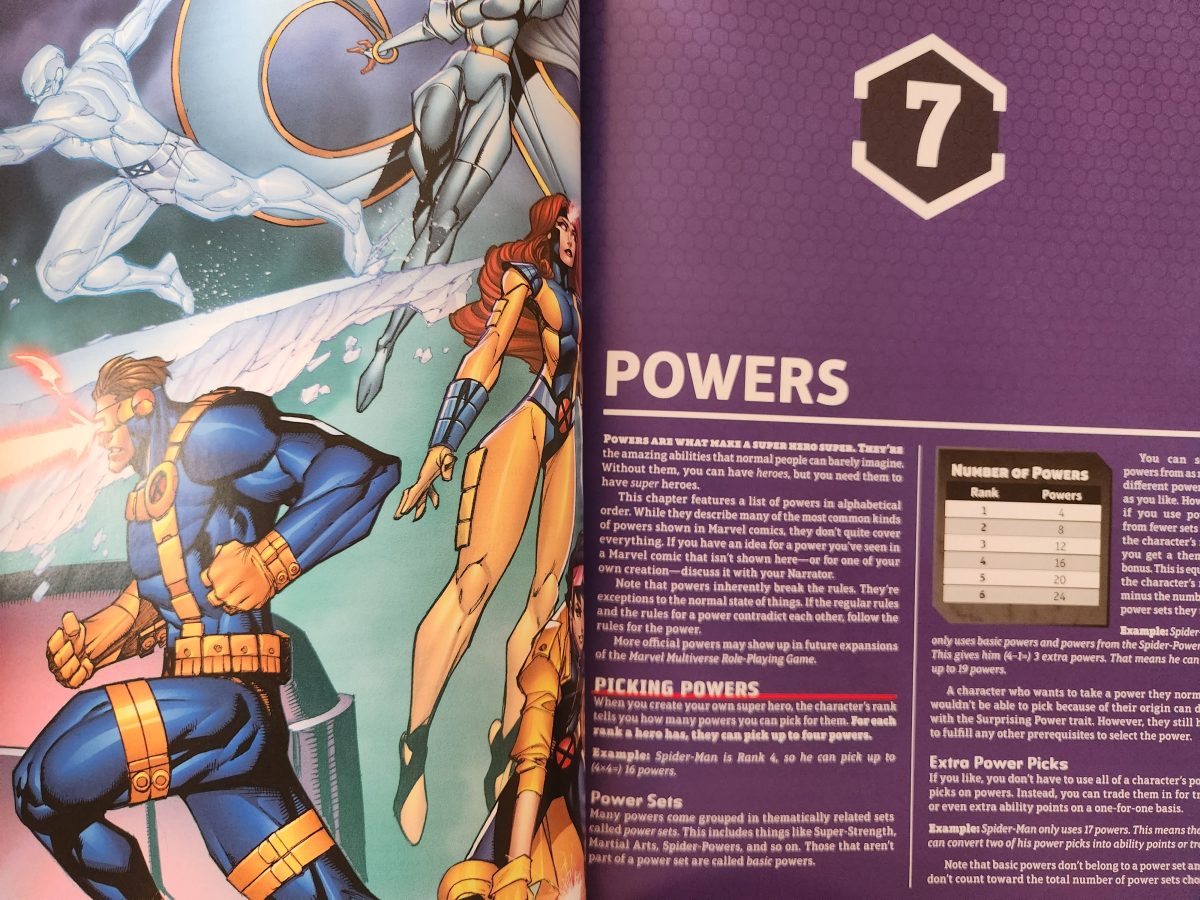
The bulk of making and playing characters comes from the list of powers. After choosing your rank, origin, tags, and traits, you will be tasked with determining your loadout of powers. This adds a lot of effort into using a premade character. Whether making one on your own or using an example from the book, you will sacrifice a lot of your day to determining the many powers’ effects and copying them to your own separate character sheet. The game’s virtual tabletop probably saves a lot of effort for this process, but if you want to play this at home, you’ll need to be ready to own multiple copies of the book and be ready to spend time navigating through it. This is all the worse for a GM who wants to use NPCs, whether or not they plan on it beforehand.
Those powers are everything you could expect or need from this book. Martial arts, time manipulation, personal transformation, and more will let you construct pretty much anything you could need in the vein of superheroic characters. Most of them are written with simplicity and clarity that will make them easy to learn and use. Most of them. You see, Multiverse is often written with a casual air that I didn’t find conducive to mood or mechanics. As an example, take a look at these two Trait descriptions on the same page, Clinician and Extra Occupation.
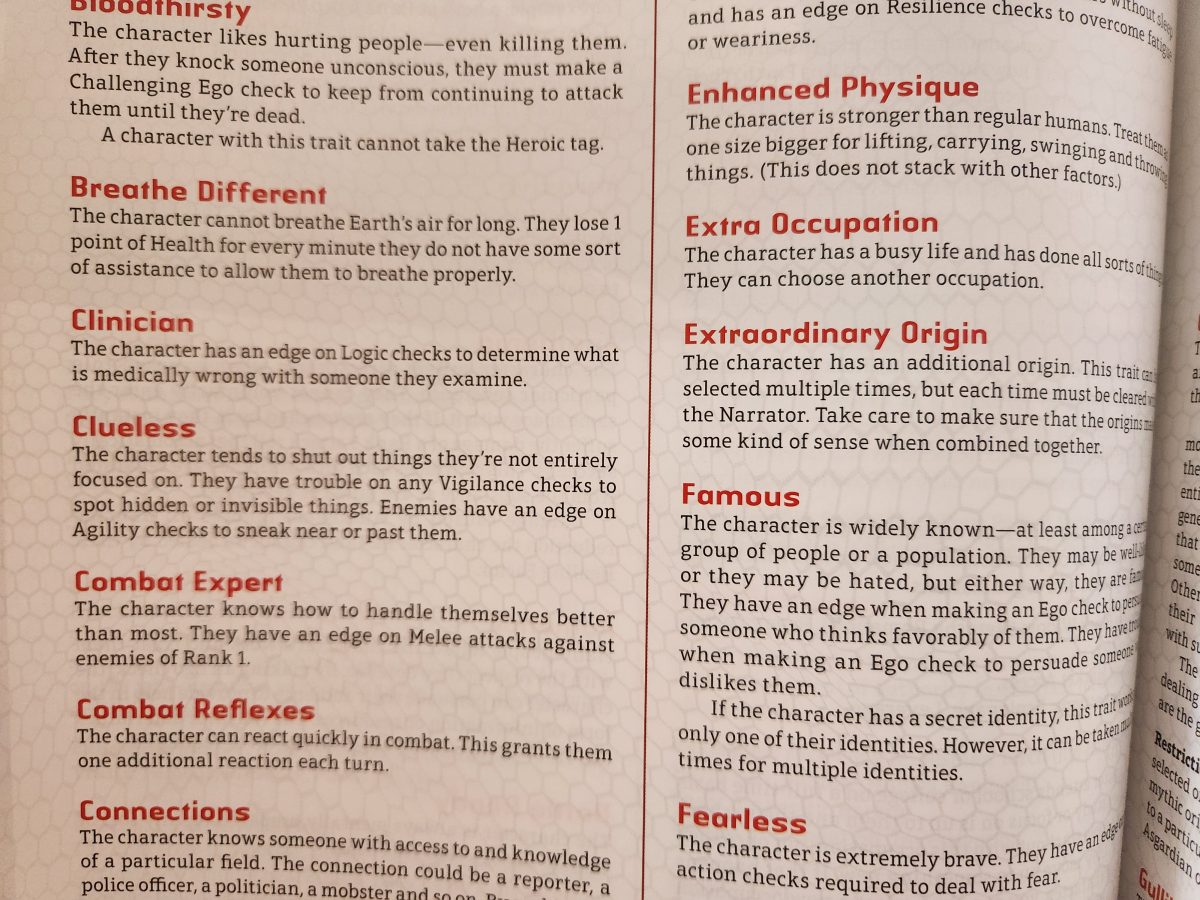
This writing isn’t bad exactly, but its technical capability can’t mistake the fact that it doesn’t inspire enthusiasm in the reader. For some of the more complicated powers it risks confusion. Any ability in an RPG needs clarity about what it does in a mechanical sense, however it works narratively. Multiverse is sometimes vague on its mechanics, and thus struggles to use those mechanics to inform a narrative.
Most of the game’s rules are about actions and timing in combat, as are most of the powers. Much like the attributes, the game’s combat feels very 5e-adjacent, and it might surprise you to learn that I don’t mean that as an insult. The pacing of combat and flow of actions is easy to learn and use, while creating great room for creativity, for variable encounters, and to give players interesting ways to use their powers.
Despite some capable advice on running adventures, most of your interaction with Marvel Ultimate will be in the context of using your powers to win fights. Almost all of the progression comes down to choosing more powers. When you have the rules under your belt, when you have chosen your characters and transcribed their powers, and when you have brought these elements together for this game’s one real focus, you can have a great time. Slinging dice and powers around the right environment is a fun puzzle of balancing your health and willpower against those of opponents who could easily be as capable as you or better, if they are even one Rank removed. Shuffling your way through characters is recommended. Limited as they are in most circumstances by their powers, playing the same character over time risks repetition, using the same powers in the same ways over time. I have not been playing the game long enough to get tired of it yet, but I have also been jumping between characters rather than hanging onto a specific group over time. If you are a Marvel fan looking for a specific niche of superhero stories, you can have a good time here.
Marvel Multiverse Role-Playing Game
All Right
The Marvel Multiverse Roleplaying Game lets you step into the shoes of the series’ many heroes or villains during their most climactic battles. Those battles are tense, dynamic, and multilayered, but do not allow the game much room to explore other areas of superhero stories.
Pros
- Art that brings all of Marvel’s characters and colors
- A generous collection of characters for players and GMs to use
- Powers that cover the range of heroes or villains you may want
Cons
- Lots of time will be spent reading powers
- A colloquial tone that hinders narrative and mechanical clarity
- Very specific focus on combat engagements
